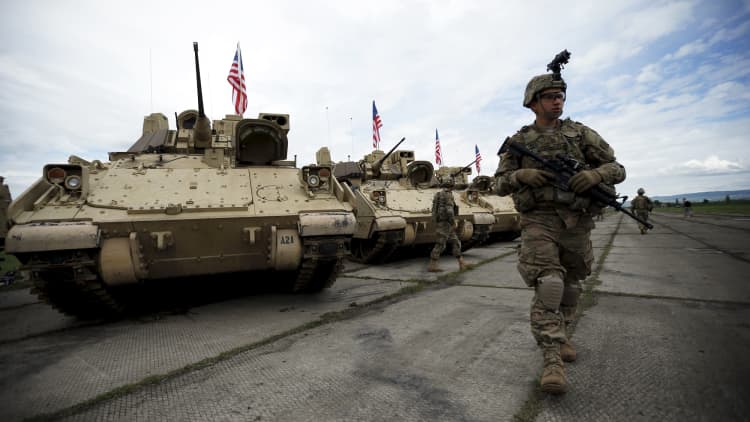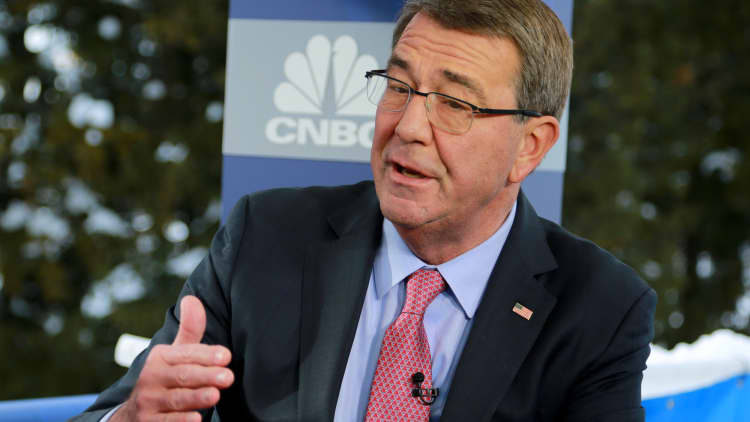
In his State of the Union speech Tuesday evening, President Donald Trump is expected to ask Congress for more money for defense spending to rebuild the military and to tout success over the Islamic State group.
The president also is expected to talk forcefully about the challenge of Iran and the North Korean nuclear threat facing the United States. Also, the speech is now expected to touch on a new strategy in Afghanistan and once again criticize Pakistan for not doing enough to eliminate terror sanctuaries.
"If he lays out the threats, the idea that we need to rebuild our military will be quite obvious to the audience," said Peter Brookes, senior fellow of national security affairs at the Heritage Foundation, the conservative think tank. "The State of the Union provides an important platform for the president to talk about the rebuilding of the military which needs some significant shot in the arm due to the wear and tear from years of conflict."
According to the administration's new National Defense Strategy revealed this month, the Pentagon singles out China and Russia as the "central challenge" faced by the U.S. armed forces. That said, some analysts believe it's unlikely the president will use the State of the Union address to call out Russia as one of the nation's top military threats.
"It would be out of character for Trump himself to say that Russia constitutes one of our primary national security problems," said David Ochmanek, senior international and defense researcher at the Rand Corp. think tank in Arlington, Virginia.
On North Korea, though, experts believe the president will use the State of the Union address to talk bluntly on the national security threat from the isolated regime's nuclear and missile advancements.
The Russia and China factor
Also the president may call out some countries for not doing enough on economic sanctions against Pyongyang, including China and Russia. The administration announced new sanctions Wednesday against North Korea and also indicated that two Chinese firms helped export metals and other items used in the regime's weapons programs. Russia also has been criticized for supplying North Korea with fuel despite earlier sanctions imposed by the United Nations Security Council.
Additionally, North Korea sitting down earlier this month with South Korea may not be lost on Trump as he stresses that all options remain on the table to defend the United States, including military action. And despite the hawkish talk from the administration about possible military strikes against North Korea, experts say Trump is not expected to talk about a war being imminent.
"The State Department and the Defense Department have been trying to walk this fine line where they want North Korea to take the threat of war seriously so that the regime will disarm," said Stephen Biddle, adjunct senior fellow for defense policy at the Council on Foreign Relations and professor of political science and international affairs at George Washington University. "But they don't want to actually paint us into a corner where we get a war."
Still, experts say they expect Trump to talk about just how close North Korea is to getting an intercontinental ballistic missile capable of reaching the U.S. mainland. Last year, North Korea test launched at least three ICBM missiles, including a Hwasong-15 in late November that raised concerns in the U.S. defense community as it was a record-breaking launch for the regime.
CIA Director Mike Pompeo was asked about North Korea during a BBC interview broadcast Monday and said the regime has the capability "to deliver a nuclear weapon to the United States in a matter of a handful of months." Also, the CIA head warned, "There is a set of military tasks that might have to be taken."
"Everything I've heard is President Trump is going to be forceful when it comes to North Korea," said Rebeccah Heinrichs, a senior fellow at the Hudson Institute, a nonpartisan think tank.
Added Heinrichs, "We've known they have a nuclear capability and the hard part is getting the nuclear weapon small enough to mount it on an ICBM to deliver it. And this last ICBM that North Korea tested, the Hwasong-15, shocked everybody."
Iran and Afghanistan
At the same time, Trump is expected to discuss the growing threat from Iran and the international support his administration is working to build against the nuclear deal with Tehran brokered by his predecessor. In remarks in October announcing his new strategy on the Iran nuclear deal, Trump called the 2015 agreement "one of the worst and most one-sided transactions the United States has ever entered into."
Trump also is likely to talk about Iran's aggressive military behavior in the Middle East and its support of proxy forces that have been a source of bloodshed in Yemen and elsewhere.
On Afghanistan, the president is expected to focus on the need to keep the U.S. military in the war-torn South Asian nation despite the spike in violence in the past month. One attack Saturday killed more than 100 people after a suicide bomber detonated an explosive-laden ambulance in Kabul. That bombing came a week after a deadly attack by Taliban militants at an international hotel in Kabul.
"There's a certain level of consternation among U.S. officials about the evolving security developments in Afghanistan, especially the ones that have happened in the last couple of weeks," said Javid Ahmad, a nonresident senior fellow of the Atlantic Council, the Washington-based think tank. "Of course they're not very happy, but it's a setback because of a failure in intelligence to preventatively detect and thwart attacks."
As a result, Ahmad said he expects Trump's comments will be "generally short on details with respect to the Afghan war." That said, Ahmad believes there's a good possibility the president will use the State of the Union address to take a swipe again at Pakistan for providing a sanctuary for Taliban militants and terrorists.
"From what I understand, Trump's message to Pakistan will be clear — that business as usual is no longer acceptable and that if Pakistan doesn't play ball, we'll continue to do what needs to be done by other means," said Ahmad.
The war on terror
Analysts suggest that the Taliban and other insurgent groups are behind recent bombings but also say the president will remain firm on the need to provide ongoing support to the Afghan government so they can stabilize the situation and prevent the country from turning back into a terrorist safe haven. Trump also is likely talk about the need to defeat the ISIS terrorists in Afghanistan and tie it to the U.S.-led international coalition's fight against ISIS in Iraq and Syria.
"[Trump] will essentially place an emphasis on how the very fact that we've had this spate of horrific attacks in Afghanistan illustrates why it's so important to stay in Afghanistan and to intensify the fight against these blood-thirsty militants," said Michael Kugelman, the Asia Program deputy director and senior associate for South Asia at the Woodrow Wilson Center, a nonpartisan policy forum. "He also will probably talk about the need to maintain a U.S. military presence in Afghanistan in order to push back against the international terrorists that are there, such as ISIS."
The number of ISIS fighters in Syria and Iraq is now estimated to be below 1,000, down from a peak of about 33,000 in 2015 when foreign fighters from at least 50 countries flocked to the region to help the Islamic State.
Rand's Ochmanek believes Trump may use Tuesday's address to the nation to claim success over ISIS terrorists in Syria and Iraq.
"If he qualifies it by saying we have defeated ISIS as a quasi-state that will be accurate," said Ochmanek. "If he says we've defeated ISIS that will be inaccurate and will probably, regrettably, be demonstrated to be inaccurate within days or weeks of the pronouncement."
Ochmanek explained that there remain "radicalized individuals" inspired by the terrorist group that pose a global threat. Indeed, there are affiliates of ISIS still recruiting fighters in Afghanistan, Chad, Sudan, Libya, Indonesia and other parts of the world as well as terrorist sympathizers that have carried out attacks on Western targets.
WATCH: Try 'coercive diplomacy' on N. Korea



